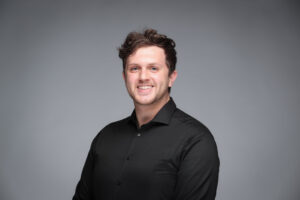Take a moment to get to know Grey Garris, the new assistant director of Multicultural Programs/LGBTQ+ Student Services.
- Tell us about yourself. I was raised in Birmingham, Alabama and grown in Starkville, Mississippi. I got my Bachelor’s of Science in Bio Sciences and Masters of Higher Education Leadership at Mississippi State University. In undergrad I was President and Vice-President of MSU’s Residence Hall Association, which introduced me to Student Affairs work, and I continued to work for my institution in grad school as the Graduate Assistant for the Holmes Cultural Diversity Center. I came to Missouri State after seeing the challenges, and therefore opportunity, to make an impact at the institution.

Grey Garris - Tell us about your job at Missouri State. My role is the Assistant Director of Multicultural Programs, wherein I focus on LGBTQ+ initiatives and projects. As of right now, I currently plan our Heritage Months series and manage the Multicultural Resource Center (MRC) and our staff.
- What do you see as the role of the Multicultural Resource Center (MRC) on campus? The MRC is a place for marginalized students, faculty, and staff to take a moment to just “be.” Existing without threat of microaggressions, taunts, derogation, and more is a fundamental non-expectation for many marginalized folks. The MRC aims to provide respite from that. We provide a place for marginalized students to feel welcomed, appreciated, heard, and free to be themselves while also building our repository of resources to build a more diverse, inclusive, and equitable Missouri State.
- Who can use the MRC? While the efforts of Multicultural Student Services and the Office of Multicultural Programs focus primarily on the personal development and individual support for marginalized students, all MO State students are welcome in the MRC.
- What are your goals for the MRC and helping our LGBTQ+ students? Fundamentally, the MRC provides resources and opportunities for marginalized students to grow personally and professionally. That includes ensuring that LGBTQ+ Students have a space they can be emphatically themselves. My central focus is on re-establishing and revamping the Safe Zone Awareness Training program to provide general to tailored education for different institutional partners to be more affirming, not just tolerant, of our queer students. Additionally, I aim to make our Transition Closet more accessible, rebuilding connections with LGBTQ+ student organizations, and ensuring we can provide valuable resources for queer students.
- How do you think the new MRC office space in the Plaster Student Union will make a difference on campus? The new space will provide not only a more centralized location for staff to build resources and programming in a space but a place that can be easily identified by our marginalized students as a place they want to be. I hope to provide useful resources, consistent rotation of professional staff visitors for professional and personal needs such as resume critique and 1:1 brief counseling, and make sure our spaces like the Reflection Room and Transition Closet are publicized to those who need them.
- What do you think are some of the challenges that are facing our students in 2021-2022? Gen Z students are coming in on a wave of racial and civil unrest, something that has defined their entire lives as individuals who never knew a world prior to the hyper-vigilance post 9/11. Our students do not expect to be coddled, despite media outrage to the contrary, instead they expect to be empowered. We must provide for each of our students the support and opportunities needed to expand their personal and professional skillsets to become the change-makers they want to be. That conflict of generational mindsets is one of the biggest challenges our students will have to face coming into Higher Education. We must do what we can to remove that obstacle and continue to elevate each generation to new heights.
- What is the last book you read and would you recommend it? Why or why not? Granted that I just exited my Master’s program the last book I read was A Third University is Possible by la paperson, which I would certainly recommend to anyone working in modern student affairs. Reviewing, critiquing, and contextualizing our current concepts of universities within the framework of America’s past with colonization, suppression and oppression of the marginalized, and more, it gives a glimpse at understanding how we got to where we are and theories on where we may be heading.
